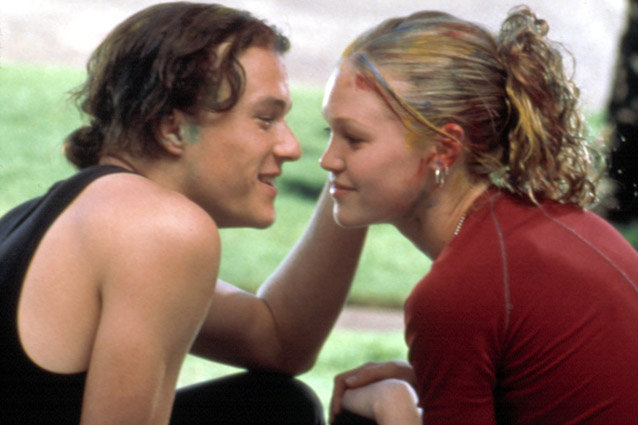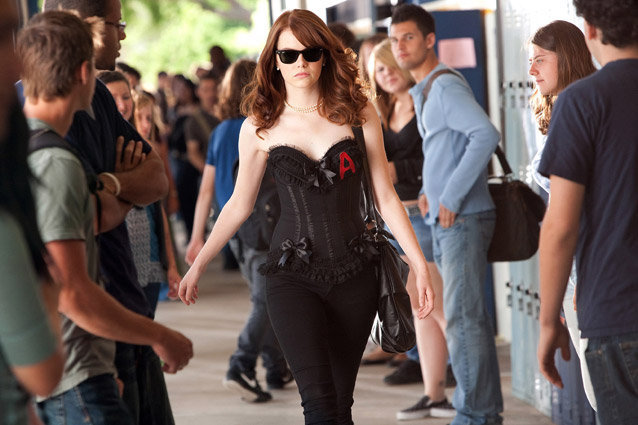
Summer: it’s a time to relax, soak up the sun, eat mountains of ice cream and tackle the massive pile of books you’ve been meaning to read. Whether you need to make your way through hundreds of pages of classic literature before school starts up again or you’ve just been putting off the heavier tomes on your shelf until you have some more free time, reading the classics can sometimes be a slog in the summer. But it’s a task well worth undertaking, and not just because it’s good to broaden your literary horizons. Many of your favorite films are actually twists on well-worn tales. Sure, they’re enjoyable on their own, but the only way to really pick up on the humor of Jane Austen or the references to Shakespeare in a suburban high school rom com is to read the books first. We’ve rounded up the best movies that become even better, funnier and more charming after you’ve read the works their based on. Consider it a well-earned reward for a book well read.
10 Things I Hate About You
Based On: The Taming of the Shrew by William Shakespeare.
Most Drastic Change: Aside from the high school setting, he plot was simplified to reduce the amount of characters and false identities. For example, Joey Donner was originally two characters, Gremio and Hortensio.
Best Reference to the Source: After Kat almost hits Michael with a car, he calls her a “shrew”; Michael also quotes Shakespearean sonnets several times throughout the film, and Cameron quotes the play itself (“I burn; I pine; I perish”). And there’s that one girl who is oddly in love with “William.”
You’d Only Notice This if You Read the Book: Almost every name in the film is a reference to something else. Padua High School refers to Padua being the location of the play, and Patrick’s last name, Verona, is where Petruchio is originally from. Kat and Bianca’s last name – Stratford – is a reference to Shakespeare’s hometown.
Clueless
Based On: Emma by Jane Austen
Most Drastic Change: Updating the film to be about ‘90s Valley girls; none of the character’s names are similar to Austen’s characters.
Best Reference to the Source: The wedding fake-out at the end of the film. Since Austen wrote a great deal about the marriage plot, all of her novels end with the heroine getting married.
You’d Only Notice This if You Read the Book: While most of the characters have Austenian equivalents, Dionne is an original character, although it could be argued that she represents Ms. Weston. Also, Amy Heckerling cut out the character of Jane Fairfax completely. She is the main obstacle to Emma and Frank Churchill’s relationship; his Clueless doppelganger, Christian, is gay instead.
Bridget Jones’ Diary
Based On: Pride and Prejudice by Jane Austen
Most Drastic Change: Instead of the large family that Elizabeth Bennet has in the book, Bridget is an only child, and has a large group of friends to give her advice, all of whom vaguely resemble her sisters.
Best Reference to the Source: Casting Colin Firth as Mark Darcy. Author Helen Fielding has said that she based the character (both in name and looks) on his portrayal of Mr. Darcy in the 1995 BBC miniseries.
You’d Only Notice This if You Read the Book: Instead of Darcy making two proposals, he only makes one; Bridget’s speech when she finds out that he is moving is a reflection of his second confession of love.
She’s the Man
Based On: Twelfth Night by William Shakespeare
Most Drastic Change: In the play, Viola just pretends to be a man, and calls herself Cesario, rather than specifically impersonating her brother Sebastian.
Best Reference to the Source: The character of Malcolm, who is based on the character of Malvolio, has a pet tarantula named Malvolio.
You’d Only Notice This if You Read the Books: Like 10 Things I Hate About You, all of the names are either adapted from those of the characters – Duke Orsino is the modern-day equivalent of Orsino, who is a duke, and the restaurant they frequent is called Cesario – or the locations – the school’s name Illyria, is where the play takes place.

Easy A
Based On: The Scarlett Letter by Nathanial Hawthorne
Most Drastic Change: In the book, Hester is ostracized for cheating on her husband with a priest; she got pregnant during the affair. In the film, Olive only pretends to sleep with people.
Best Reference to the Source: The foreign film that Olive goes to see, courtesy of one of her fake hookups, is called Der Scharlachrote Buchstabe, which translates to The Scarlett Letter.
You’d Only Notice This if You Read the Book: The film is up-front about many of its similarities to Hawthorne’s book, as Olive is studying it in class. Though Olive doesn’t have an affair with anyone, Hester and Arthur Dimmsdale’s relationship is paralleled in the affair that Mrs. Griffith has with Micah.
Scrooged
Based On: A Christmas Carol by Charles Dickens
Most Drastic Change: At the end of the film, Frank reunites with his love, Claire. However, in the book, too much time has passed for him to reconcile with Belle, and so he is instead content with becoming part of the Cratchitt family.
Best Reference to the Original: In addition to Frank Cross joking about “scaring the Dickens out of people,” one of the TV shows he produces is called “Scrooge,” which was an alternate title that Dickens published the story under.
You’d Only Notice This if You Read the Book: The Bob Cratchitt part is played by two different characters: Frank’s overworked assistant Grace Cooley and the much-abused yes-man Eliot Loudermilk.
O Brother, Where Art Thou?
Based On: Homer’s The Odyssey
Most Drastic Change: Instead of journeying home after a great war, Ulysses has escaped from a prison chain gang.
Best Reference to the Source: The film is filled with references to the epic, but the cleverest is the repeated use of the song “Man of Constant Sorrow,” as the name Odysseus (the Greek equivalent of Ulysses) means “man who is in constant pain and sorrow.”
You’d Only Notice This if You Read the Book: In order to win Penelope’s hand in marriage, all the suitors must string Odysseus’ bow and shoot an arrow through a dozen axe heads, but only Odysseus is strong enough to string the bow. In the film, Ulysseus also strings a bow in order to prove that he is who he says he is, and not an imposter.
Ruby Sparks
Based On: Pygmalion by George Bernard Shaw.
Most Drastic Change: In the play, Higgins “makes” Eliza by transforming her from a flower girl into a lady, but in the film, Calvin physically creates Ruby, as she is a product of his imagination.
Best Reference to the Source: At the end, Ruby becomes her own person, and leaves Calvin behind to do what she wants and become who she wants, which reflects the controversial ending of the play, in which Eliza leaves Henry behind in order to marry Freddy, even though Henry disapproves. The ending of Shaw’s play was very controversial when it was first performed, but it was important to him that Eliza doesn’t marry Henry.
You’d Only Notice This if You Read the Book: Calvin’s brother, Harry, repeatedly warns him to be careful with what he’s doing, and not to disregard Ruby’s emotions, just like how Henry’s friend, Colonel Pickering, constantly warns Henry to be kind to Eliza and to treat her like a real person, rather than an experiment.


